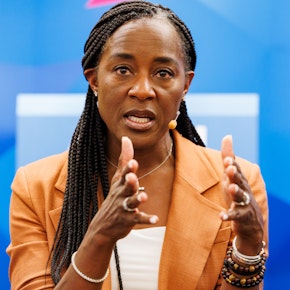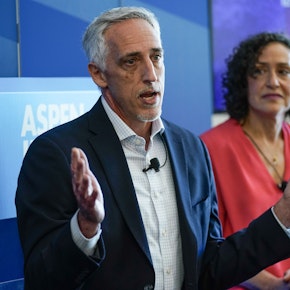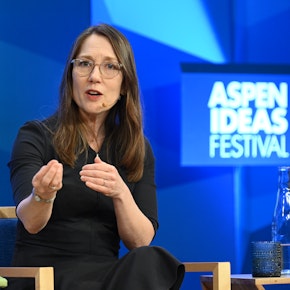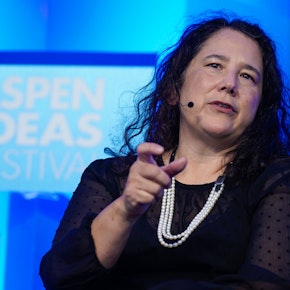Economy
American

Alongside climate adaptation, wealth inequality is one of America’s most urgent problems. Learn from a diverse group of innovators about their contributions and commitments to a more equitable wealth agenda and why they are hopeful substantive progress will be made.

The American economy motors on, with unemployment near record lows, incomes outpacing rising prices, the debt default averted, the stock market showing surprising strength, and the much-predicted recession still not in sight. Using the charts he brings to MSNBC’s “Morning Joe” and his New York Times op-eds articles, Steven Rattner will attempt to square why, then, American...

Economic uncertainty continues its reign of confusion, vexing financial leaders, regulators, and consumers with worrisome inflation and unpredictable markets. Experts weigh in on whether we can avoid a recession, what today’s banking and political difficulties signal about the future of lending and saving, and how workplace developments, A.I. advances, and complex geopolit...

How are business leaders navigating rising expectations from employees, investors, customers, and communities in a fractured political environment, while progressing on the long-term success of their companies? Hear from executives working in real time to balance competing interests, and about what they see ahead.

Digital skills open doors to jobs in tech, media, and across all industries. Connecting diverse students and workers with the education and training needed for the 92% of today’s jobs that require digital skills creates a pipeline of talent, critical to driving economic opportunity and mobility.

Plenty of organizations find success without codifying a specific purpose. Why, then, do more and more CEOs find purpose to be so valuable for leading in today’s increasingly complex, multi-stakeholder landscape? And how are they using it to make decisions, shape culture, innovate, and grow?

In a time of historically low trust in leaders and institutions, how can leaders build trust across lines of difference, depolarize solutions, and not live in fear of cancel culture? What does it look like to lead effectively today and increase the health and economic well-being of communities, families, and children?

Businesses of all sizes are struggling with skills gaps that threaten their growth, while millions of Americans are locked out of jobs by a paper ceiling. How do we build a skilled, fair workforce that meets the needs of employers and helps people reach their economic potential?

Meet three disruptive business leaders — all part of the Aspen Global Leadership Network — who drive significant economic value by leveraging emerging technologies to create sustainable, inclusive, and efficient business models in drug delivery, banking, and community-focused finance. Putting values-based leadership first, they address societal needs and drive economic gro...

Allowing everyone a fair chance at economic prosperity and upward mobility is a goal we can all support. But, how? Leaders of investment disruptor Robinhood, the MacArthur Foundation, and Prudential join to discuss the systems, practices, and policies to provide greater access to capital markets.

Drawing on decades of writing about the economy for The New York Times, Pulitzer Prize-winning writer David Leonhardt offers a preview of his forthcoming book and examines the past century of American history, from the Great Depression to today’s Great Stagnation, in search of an answer.

The 21st-century U.S. economy has faced significant challenges, of which the ripple effects — job loss, decreased access to credit, delayed investments, financial instability — have led to hardship for Americans and businesses alike. As the market ebbs in the wake of overlapping crises, how can a modern American Industrial strategy transform key economic sectors, strength...

As U.S. cities adjust to a new post-pandemic normal — characterized by empty office buildings and decreased foot traffic — how are city and federal leaders working with small businesses to reimagine downtowns?

Private equity firms are using leveraged buyouts, venture capital, and other funding sources to acquire hospitals, clinical practices, nursing homes, and other health-related businesses on a grand scale. In 2021, they poured more than $200 billion into the sector, compared to $41 billion in 2010. Investors claim their capital will expand access to care, drive innovation, f...

The rapid rise of retail health presents traditional provider organizations with many challenges as they shift beyond a facility-based care model to one more closely aligned with patient expectations for convenience, affordability, and a personalized, consumer-oriented journey. It also introduces vast opportunities to leverage emerging technologies and care models to impro...

It’s no secret that money in the hands of women is money well taken care of — with copious evidence to prove it. The question is how to get more money into those hands, especially now. An estimated 1.2 million women left the workforce between 2020 and 2022 — thanks largely to the pandemic’s demand for caretakers at home — effecting an enormous economic setback for women an...

The pandemic wreaked havoc on firms across the US, and the smaller businesses that actually comprise the majority of economic enterprises were hit hardest. There are 31.7 million small businesses around the country, comprising 99.9 percent of all companies and employing over half of the American workforce. And the challenges they have faced from the pandemic and its ongoin...

A majority of Americans say that distrust is their default setting, fueled by growing distrust of democracy, media, and government, according to the 2022 Edelman Trust Barometer survey. The survey found that business is now the most trusted institution, filling the void left by paralyzed and incompetent governments, but that trust has simultaneously become localized: in my...

“Follow the science” has become a Democratic mantra, but many Americans are wary of experts and believe elites look down on them. Have Democrats become too identified with technocratic ways of speaking — about the economy, the pandemic, climate change? Has this deepened the political divide between those with and those without college degrees? Can Democrats reconnect with...

As organizations grapple with the new normal of hybrid work, what does it mean for how people feel about their jobs, their colleagues, and their connectedness to their professional communities? In a competitive talent environment, how can organizations foster a culture of meaning and connection at (and beyond) the office? What are the costs of people not feeling connected...

